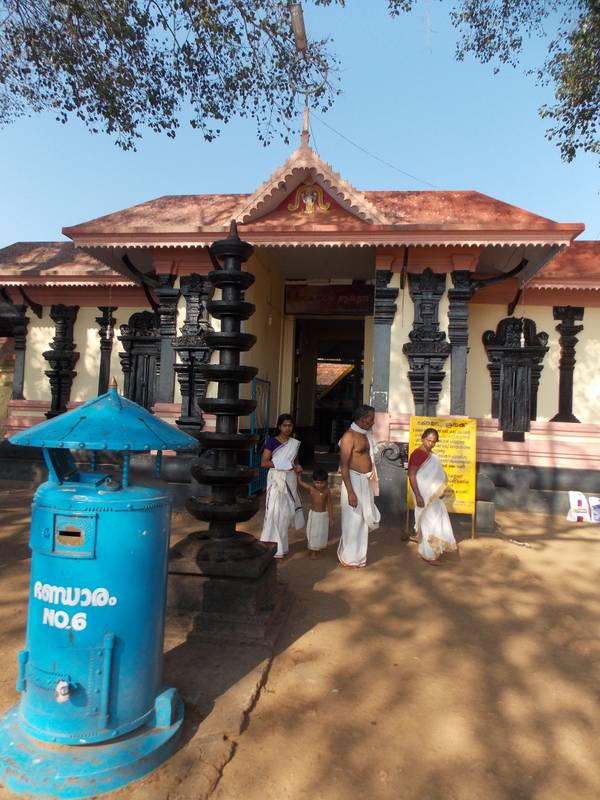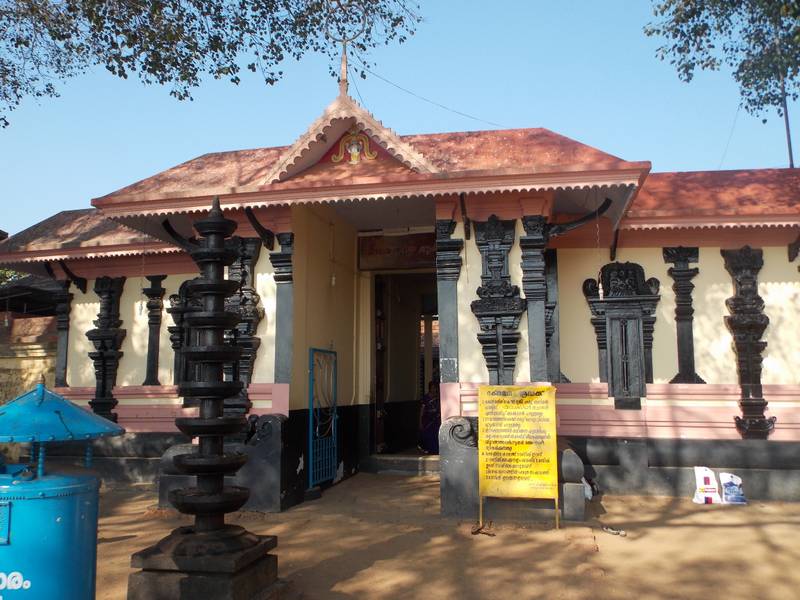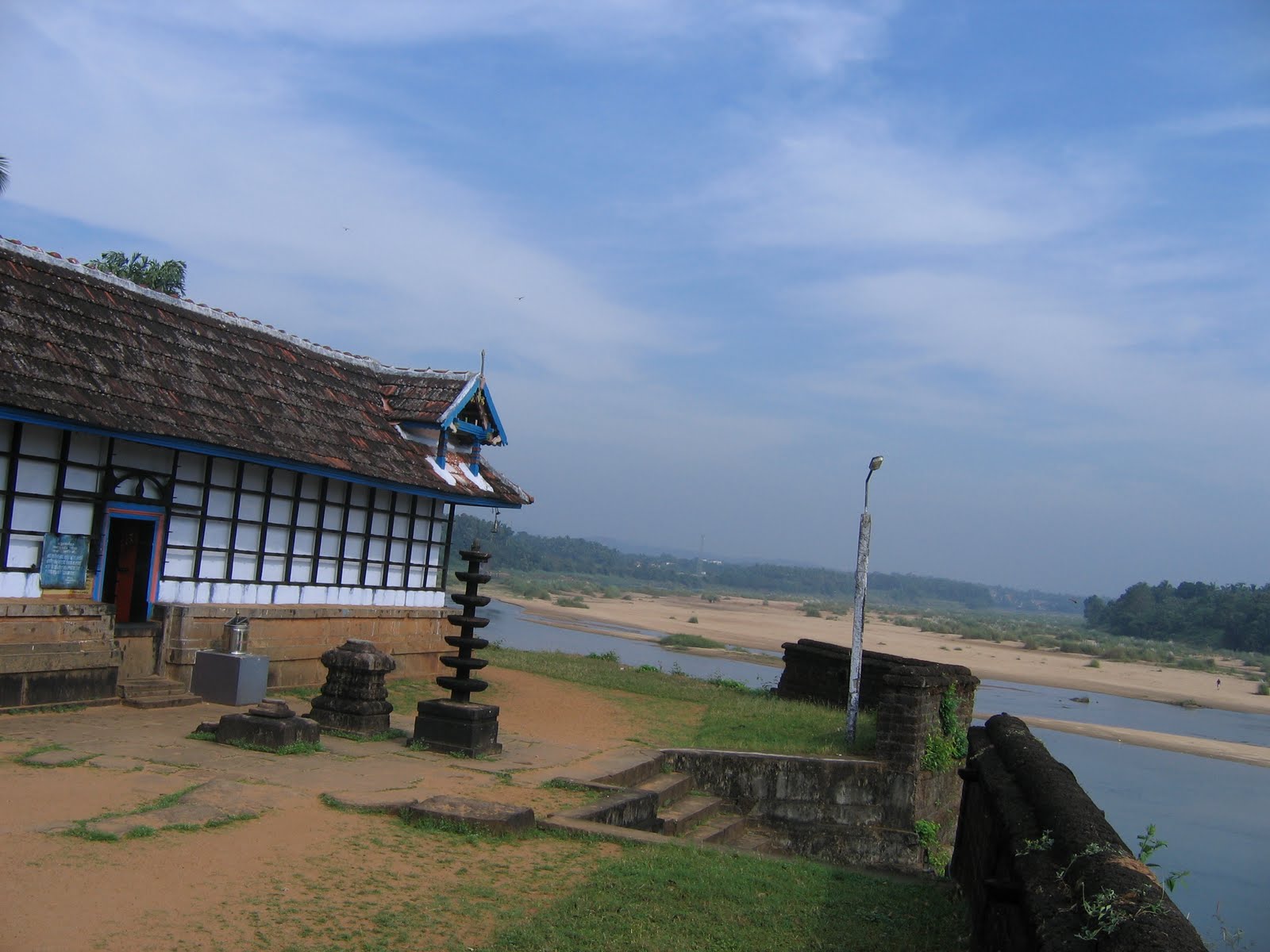Article by Sri Sadagopan Iyengar Swami, Coimbatore
It was a tiny hamlet in Kerala. And like all other villages in Kerala, this too was filled with greenery and fertile. The villagers were simple and straightforward. And like most of the Keralite villages, this too had a Krishnan Koil at the eastern end. It was a small temple, with just the main shrine and an outbuilding for preparing the Lord’s food. Though it was years since the last renovation took place, the sanctum was in fairly good shape. And the temple’s ambience was such that it afforded immediate peace to the visitor: it was totally free from the blaring of loud speakers and such other intrusive noise. All one could hear was the hum of bees frequenting the small but fragrant flower garden at the temple, which produced the blossoms for the Lord’s garland. All around were paddy fields, with fish playing in the water-logged earth. Green fields stretched as far as the eye could see, with the Bharata Puzha winding its way lazily in the distance, from which river water was brought for the Lord’s daily abhishekam.
All the villagers had made it part of their daily itinerary to visit the temple. This was in no small measure due to the beauty of the archa vigraham which graced the Srikoil. The Krishna who inhabited the small but clean sanctum sanctorum inspired immediate love and affection in the onlooker. Though He had the mandatory weapons on His two hands and the lotus in the third, His beauty was such that one was tempted to take Him into one’s arms and give Him a bear hug. It was a matter of never-ending debate among the villagers as to whether even the original Sri Krishna had been as beautiful as the deity at the temple. The broad eyes of the moorti appeared to look straight at the devotee with love and compassion. Not only did the eyes radiate mercy and mirth—they appeared to invite an equal and emotional reciprocation from the devotee. They appeared to invite confidences, promising never to reveal them to anyone else. They appeared to look straight into the soul of the devotee and to suggest remedies for the problems found there. The mouth, slightly curved at the ends, bestowed what appeared to be a beaming smile on the devotee, making him very welcome. The hand that was not burdened with the weapons or lotus was held out in a protective posture, assuring the devotee of comprehensive refuge immediately upon surrender. His feet were tiny, with dainty fingers firmly planted on the earth, expressing His resolve never to move away from this idyllic spot and His favourite audience. The archa vigraham—(though it would hardly be appropriate to call this living, pulsating moorthi as a vigraham, we use the term for want of a better one)—was of Bala Krishna, the enchantingly young form of the Lord, making everyone eager to take Him in their arms, cuddle Him and murmur endearments to Him for ever. Though unfortunately devotees were unable to indulge these wishes due to Aagamic restrictions, they did do so in their mind and derived immense pleasure from the exercise. Predictably, whenever a male child was born in the village, it was named Krishna or one of its innumerable variants.
You know what the adage says, kuzhandayum Deivamum kondaadum idatthile (both a child and the Lord reside only where they are treasured) and the Aagama says—Pratimaayaam saanidhyam archakasya tapo balaat (divine presence in the vigraham is due to the penance and devotion of the Archaka). True to these, the Archaka, a Namboodri Brahmin, was a devoted soul, having dedicated himself to the worship of the enthralling moorthi. The Namboodri was poor, but extremely contented and happy that he had been blessed with service to the Deity. He used to dress up Sri Krishna with as much love and care as he would bestow on his own son and used to enquire of villagers with pride every day as to how beautiful the moorthi looked. The priest offered all ministrations to the little Lord with devotion, love, affection and utmost sincerity. During the ceremonial bath, the priest would ensure that the water was neither too cold nor too warm, but just at the correct temperature. While pouring the scented water over the Deity’s dainty head, the priest would ensure that it was done slowly and in small doses, so that it did not suffocate the young Krishna. When he offered the Deity milk, the Namboodri would take care to see that extra sugar was added, as Sri Krishna liked everything sweet. And he would also ensure that the daily diet offered to the Deity had its quota of favourite dishes like butter, vilaampazham, etc.
The temple, being small, had a one-man staff consisting of the Namboodri, who never took leave nor claimed his statutory rights of weekly rest, despite being a citizen of the rights-conscious Kerala state. In fact, it was with extreme reluctance that he closed the doors of the sanctum every day upon expiry of the appointed hours and that too due to the feeling that the little Krishna deserved rest. He used to eagerly await the reopening hours on the morrow, when he would be reunited with the apple of his eye. Even when playing with his small son who had just undergone upanayanam, thoughts of the little Krishna dominated the priest’s thoughts.
One day, the priest had news of his mother (residing at a village a few hours away) being very sick and had to rush to her bedside. He was torn between his devotion to the Deity and the need for attending to its needs and his obligations towards his mother. After considerable thought, he prepared the Deity’s food (he would never allow anyone else to do that) and told his son, “Krishna! I am going to see your grandmother and will be back in the evening. In the meantime, finish your bathing and sandhyavandanam, go to the temple and look after Sri Krishna. As I have already finished the Abhishekam, all you need to do is to offer the cooked food, kept in this vessel, to Sri Krishna. Do it with all sincerity and remember that Sri Krishna too is a young boy like you and will feel hungry if you fail in your duty.” And just to ensure that the boy did as he was bidden, the priest told the boy that upon his return, he would enquire with Sri Krishna whether He had been fed properly.
The priest dragged himself away from the temple with reluctance, plying his son till the last minute with instructions for feeding the Deity. Charged with this onerous task, the young boy took bath twice for good measure, finished his spiritual chores with greater sincerity than ever and set off to the temple with the vessel containing food for Sri Krishna. He didn’t even swing the vessel to and fro, as small boys are wont to, but carried it carefully, remembering his father’s homily about Sri Krishna’s need for timely feeding.
Arriving at the temple, the boy cleaned his feet, performed a pranamam before the Deity and entered the sanctum with a loud prayer on his lips to announce his arrival. When he glanced at the moorthi, it appeared as though little Krishna was already famished: His cheeks appeared sunken, His eyes drawn into their sockets and His tummy empty. Recognizing the tell-tale signs of hunger and feeling slightly guilty for the delayed offering, the boy hurriedly uttered some mantras and put the vessel with the food in front of the Deity. He told the Deity, “Krishna! Here is your food. Do eat it quickly, as you appear to be very hungry. If you don’t look like your former well-fed self, my father will scold me on his return in the evening for not having looked after you properly”.
Having said this, the boy came out of the sanctum, expecting the famished Krishna to finish off the food promptly. He also had an uncomfortable thought—what if the food was not enough and the Deity asked for more? Dismissing this thought and after a decent interval, he peeped in to confirm that Sri Krishna had finished His repast. To his consternation, the food remained as it was, with apparently not a single morsel having been consumed. Alarmed at the thought of what his father would say, the boy told the Deity, “Why have you not eaten? You did appear hungry and when I have brought your food, why have you left it untouched? Don’t you like it or what? After all, it was prepared only by my father who is your regular cook! Do eat up quickly as you will otherwise faint with hunger!”
Five minutes went by and to the boy’s distress, the food remained apparently untouched. The boy looked for long at the Deity’s countenance for any sign of displeasure or annoyance, but could find none. He sat down before the Deity, lost in thought as to how to make Sri Krishna eat. It then struck him—how could the Deity be expected to eat plain rice, without any supplements to make it tasty? He himself would not eat mere rice, without any side dishes or seasoning. With relief at having discovered the reason behind the Lord’s indifference, the boy set off to his house and brought some curds and raw mango smeared with chilly powder, both of which were his own favourites and he was sure were those of Sri Krishna too. He could not envisage anyone not loving a meal of rice with curds and seasoned mango and the combination made his own mouth water.
Priding himself on correctly diagnosing the cause for the Deity’s lack of appetite and for taking prompt and adequate remedial measures and reminding himself to tell his father to similarly enrich the food thereafter, the boy now put the enriched and embellished fare before the Deity and told Sri Krishna, “I have gone to considerable trouble procuring the additional items. Now at least eat up fast and satisfy your hunger.” Out went the boy and waited for ten minutes, giving Sri Krishna time to have His breakfast. Sure that the meal would have disappeared and that the Deity would have had its fill, the boy peeped in. To his utter dismay, the meal was still untouched. The boy even counted the pieces of seasoned mango to see whether the Deity had consumed at least some of it, but found them all quite undiminished. Nor had the rice level in the vessel come down even a little bit.
Alarmed at the thought of the Deity’s continued intransigence and worried at what father would say upon his return, the boy pleaded with Sri Krishna to have his meal. He had seen his neighbours having a tough time feeding their children and the various strategies they adopted for ensuring that the food went into their tummies. Applying them here too, the boy cajoled Sri Krishna to have at least a mouthful, thinking artfully that the real struggle lay in making the Deity consume the first morsel: thereafter, the tastiness of the food would automatically ensure the consumption of the rest. When this too proved futile, the boy threatened to complain to his father about the Deity’s stubbornness and to ensure commensurate punishment. Despite the use of all tricks in the book, the Deity remained unmoved and the food untouched.
The boy’s patience ran out: he started shouting at the Deity and threatening to drown himself in the river if the former did not cooperate. He gave an ultimatum—he would wait for another ten minutes: if, by that time, the food had not been consumed, he would carry out his threat of drowning in the Bharata Puzha.
Now Sri Krishna was in a dilemma: obviously the boy did not understand that Deities in temples did not actually consume the food offered to them. (If such were to be the case, human beings would stop the practice of offering food). The boy was too young to realize that the subtle portion of the food only was accepted by the Lord and the gross portion left untouched. Further, the act of offering to the Deity was known as “Nivedanam” or showing the food to the Lord and did not constitute actual consumption thereof by the Deity. There was however no point in trying to educate the little boy in the nuances of Aagamic tenets at this juncture. Sri Krishna wished that the regular priest had not taken leave that day, putting Him in such a predicament. Time was ticking away and the determined boy would probably carry out his threat to drown himself, if the food had still not been consumed.
Reaching a decision at last, Sri Krishna sat down and consumed the rice, curds and mango. He had to admit that it did taste good: the last such meal that He had had was during the Krishnavataram, in the company of boisterous Gopa kids. Finishing off the last morsel with relish, Sri Krishna banged the empty vessel down, just to let the boy waiting outside know that He had finished, and resumed His formal posture as the Deity. He also hurriedly reassumed the weapons and the lotus He had put down for taking His repast.
Hearing some sound inside the sanctorum and after the expiry of the deadline he had set, the priest’s son peeped in and was delighted to find that the threat had worked and that the Deity had indeed consumed the food. Happy at the turn of events and shuddering to think of the now receding possibility of having to drown in the cold river, the boy hailed a passing devotee and showed him the empty vessel, just to make him a potential witness, if required later. The devotee however was a cynical soul and arrived at the natural conclusion that the boy had himself consumed the food meant for the Deity and was now resorting to tall tales to save himself from punishment.
At this juncture, the regular priest arrived at the temple, his mother having fortuitously recovered much faster than expected. He listened with amazement to the tale the devotee told him and concurred totally with the finding that the boy had indeed consumed food meant for the Deity. The priest could think of no other explanation for the disappearance of the food. In all his years of ministering to the Deity, he had not come across a single instance when the food had even diminished a little, leave alone disappeared completely, indicating acceptance by the Deity. Saddened at the boy’s having appropriated for his own consumption the Lord’s food and angered at his continued assertion that the Deity had eaten the food, the priest decided that some draconian punishment was in order for the twin follies of eating the offering and lying about it as well. He went to a nearby casuarina tree, broke off a slender but sturdy branch and raised it in the air with the aim of bringing it down firmly on the boy’s back. However, a stentorian voice rent the air and said, “Don’t beat the boy. It was indeed I who consumed the food. If you think it is wrong, you may use the stick on me!”
Amazed at the Asareeri (disembodied voice)’s assertion, the priest dropped the stick and ran to the sanctum, to find Sri Krishna wearing a beatific smile and also the remnants of curd rice on His lips, to demonstrate that it was indeed He who had consumed the food. Tears sprang to the eyes of the priest: while he was indeed glad that the Lord had consumed food prepared by him, he was also sad that this had not happened a single day when he had been in charge and occurred only when he was away. He wondered whether there had been shortcomings in his ministrations, due to which the Lord had not partaken of the offering so far.
Dispelling all such notions, Sri Krishna’s eyes spoke to the priest with kindness and compassion. The boy too, with the threat of punishment withdrawn, gave his father a full account of what had happened and how ultimately he had succeeded in forcing the Deity to consume the food. The priest was moved beyond measure at the Lord’s kindness and compassion and His readiness to partake of mundane curd rice just to ensure the satisfaction of an infant. His love and affection for the Lord increased manifold and his ministrations acquired greater care and concern.
When the villagers heard what had happened, they were speechless with amazement. It only deepened their conviction that this was no mere speechless deity made of stone and mortar, but one endowed with divine presence and prepared to indulge the whims of even an inconsequential little brat.
And guess what? From that day onwards, curd rice and mangoes became a staple offering for Sri Krishna in that village!











A beautiful happening narrated beautifully.
A very illustrative example showing the passion of Lord Krishna on loving pilgrims
The name of the village is not known. Please let us know how to reach this place.